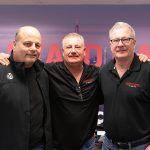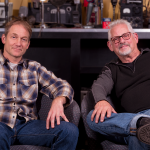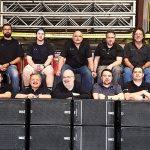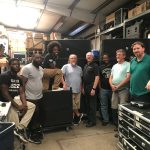North Carolina’s SE Systems Has Grown from a Local Staple to National Tours for Select Clients
When Cliff Miller was a touring musician, he had many things going through his mind. Sure there was the tuning of his guitar and the song the band was playing, but Miller’s mind would occasionally drift to how the band was sounding out in the house. It was the early ‘70s, and Miller, who was playing guitar with Doc and Merle Watson, had already started to think about starting a regional sound company.
In the nearly 35 years since then, Miller and a team of employees and associates have built SE Systems into one of the best regional sound compa-nies in North Carolina. Headquartered in Greensboro, SE Systems is a full-service production company that provides audio, lighting and staging and boasts retail outlets in Greensboro and Charlotte.
Hometown Hero
Miller came to music, audio and electronics early in life. “I started out in a band in junior high, and at the time, I’d modify an old Stromberg-Carlson amplifier, put a speaker with it and make a guitar rig,” he recalls. “So, when I first started, I was putting together my own stuff, fashioning a P.A. out of old tube components and a couple cut-away speakers.” [Pause] “Yeah, it’s changed quite a bit.”
That experience lead him to all sorts of work before SE Systems was born, including working as a service technician for a couple of music companies in town, where he’d fix church organs, install small systems or work on gear. At the same time, he was working at a radio station as an engineer and DJ.
The schedule enabled him to continue playing music and learn about P.A.s. The first P.A. he bought was the one he built for the music company employing him. “I was still doing service work because I needed the income to buy everything I needed to buy,” he says.
Somewhere in the mid-’70s, the company started to pick up steam, and Miller began providing sound services — first to local music festivals and then at college venues. The college work, since he was between Duke, N.C. State and the University of North Carolina, kept him busy. In addition to working with the Watson’s, with whom he continued to play, some of Miller’s early gigs included Dizzy Gillespie and Doc Severinsen.
So, working with big, boomy auditoriums with no acoustic treatments and equipment circa 1975 must have been exciting. “Oh yeah, nothing like trying to stack stuff up to hit the balconies and the back of the room,” he says with a laugh. “The funny thing? How big can the box be and still have only two speakers?”
While he laughs after saying that, the truth of the statement led him to start building his own enclosures and then loading them with JBL components. “At the time, the things that you could buy from the manufacturer were not suited for live reinforcement,” he reports. “Typically, we could build our own cabinets and do a really nice job of it using good plywood and save a whole lot on shipping across the country. Actually, they’d hold up better because a lot of [the manufacturer-built cabinets] were built from particle board and would not hold up on the road.”
Learning from Others
His time on the road as a musician also taught him what worked and what didn’t when it came time to start SE. “You pick up a lot from dealing with other sound companies,” Miller says. “It still sticks out in my mind the companies that I enjoyed working with, and it always came down to people who were attentive, had good service and good people, and who understood the music that you were doing. So, as we picked up more employees, and as the company grew, I put in that philosophy of being customer-friendly, reactive and attentive to anybody on the stage.”
Diving headfirst into the sound company market meant, of course, that he would have to leave some of his performing dates behind. It wasn’t difficult for him to make the switch. “The longer that I played as a musician, and the more musicians I met traveling around doing festivals, I felt that my first limitation came as a musician versus as a sound engineer,” he says. “So, I felt like I was in a better position being on the console end, still understanding what needed to happen on the stage. I was all prepared and ready to make that switch because being around that many great musi-cians gave me the desire to make them sound as good possible.”
In addition to sound services, Miller expanded SE so that the company now provides lighting and staging to clients. Lighting and staging came be-cause some of the region’s leading companies were putting together full production packages, and promoters began to expect it. “They felt that if they could have one big truck come in and bring all the gear, they were saving a little bit of money,” he says. “So, we almost got forced into the lighting business to be able to compete. The next thing you know, people were asking us for a stage, and we bought staging. We own a couple of mobile stages and lots of decks and stuff like that. All of it still helps to pay the bills.”
In the ‘80s, SE Systems opened a pair of retail stores in Greensboro and Charlotte. Turns out, that may have been the most important move the company has made. “Today, the sales side of the business does about six or seven times the gross of the sound reinforcement, lighting and staging side of the business,” he reports.
Good, Not Cheap
The local competition, Miller reports, is strong, yet each company has its own niche. SE Systems continues to service some of the top touring acts that come through the area and has added a number of corporate clients to its roster. “I tend to think that we may be the priciest company in the area,” he allows, “but at the same time, we’re one of the oldest. One of the things we continue to invest in is personnel. Everybody in this business realizes it’s not just about the gear, it’s who you’ve got running it and the people who you have representing the company.”
Eventually the company’s reputation, and Miller’s musical history, led to a number of phone calls from bluegrass bands looking for regional sup-port as they’d roll through the Southeast. Then, in 2002, the company was tapped for the Down from the Mountain Tour, which featured some of the biggest names in the genre. “They wanted us to do the summer tour, which was national. At the time, we had never toured, and I have a lot of good engineers who work for me because they didn’t want to tour,” Miller reports with a laugh.
So, Miller decided it was time for him to go back on the road. “A lot of my friends and a lot of people I’d known for years were on that tour, so I thought it was a great thing to be able to go out with that kind of music and expose it to the national audience,” he says. “I wanted to do my best to make them sound as good as possible. We had 12 busses and one truck. We kiddingly called it the Hillbilly Lollapalooza.”
That tour was enough of a success that the company opened the door to other tours. Since then, SE Systems has provided audio gear, as well as Miller’s talents as production manager, to national and international tours by Alison Krauss and Union Station.
Miller has 48 JBL VerTec boxes out on that tour, while the company’s headquarters is stocked with an assortment of JBL HLA and VerTec boxes to service regional work. On the console front, SE has purchased boards from Midas, Yamaha and Soundcraft. “A lot of people still ask for an ana-log console,” Miller reports. “They just like it, they’re comfortable with it and that’s what you’ll give ‘em. For the people who like carrying their card with them, plugging in and using a digital console, then we can do that. We’ve been using two PM5Ds with Alison for quite a few years, and they work really well for us.”
Building the book of business, and continuing to service it, has been the recipe of success for SE Systems. “It’s funny, over the years when you keep customers long enough — as they are growing you tend to grow along with them,” Miller says. “If you really want to keep that client for the long term, you really have to be attentive to their needs and respond to their requests. So, a lot of the things that we do come directly from the re-quests we get from our customers.”



